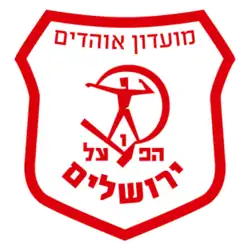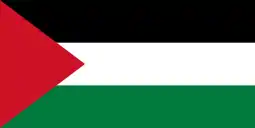Hapoel Jerusalem F.C.
Hapoel Jerusalem Football Club (Hebrew: מועדון כדורגל הפועל ירושלים, Mo'adon Kadouregel Hapoel Yerushalayim) is an Israeli football club which existed from 1926 till 2019 and again since 2020 after Hapoel Katamon Jerusalem has been renamed. The club currently plays in Liga Leumit and is based at Teddy Stadium in Malha, Jerusalem. The Club has won the Cup title on 1973.
 | |||
| Full name | Hapoel Jerusalem Football Club מועדון כדורגל הפועל ירושלים | ||
|---|---|---|---|
| Founded | 1926 | ||
| Ground | Teddy Stadium, Jerusalem | ||
| Capacity | 34,000 | ||
| Owner | Voluntary association "Katamon - fans club" | ||
| Chairman | Yotam Karmon (Chairman), Uri Sheradsky (CEO) | ||
| Manager | Ziv Arie | ||
| League | Liga Leumit | ||
| 2019–20 | Liga Leumit, 6th | ||
|
| |||

History
Hapoel Jerusalem Club was established in 1926 and played in the inaugural season of the EIFA league, playing the league's first match against local rivals Maccabi Hasmonean Jerusalem.[1][2] The club played in the league for its first three seasons, however, the club was restricted to playing mainly in the Jerusalem area due to travelling difficulties. The club participated occasionally in the Palestine Cup, reaching the cup final in 1943, losing to a team from the Royal Artillery 1–7.[3]
After the establishment of Israel, the club registered to play in the makeshift second tier league, Liga Meuhedet, in the Jerusalem-Central division, which the club won. The club continued to play in the second division (Liga Bet until 1956 and Liga Alef afterwards), until it was promoted to the top division at the end of the 1956–57 season, after finishing second in promotion play-offs. Following the promotion, the club stayed in the top division for 21 seasons, achieving its best position, 3rd, in 1972–73. In 1971–72 the club reached the State Cup final, losing to Hapoel Tel Aviv 0–1. A season later, the club reached the cup final again, this time winning the cup.[4]
The club was relegated to the second division in 1979, but bounced back the following season. The club continued to yo-yo between the two top divisions in the following seasons, playing his last season at the top division in 1999–2000. In 1998, the club reached its fourth cup final, but lost to Maccabi Haifa in extra time.
In the early 1990s, the club was transferred to businessmen Yossi Sassi and Victor Yona. The two ran the team together until falling out, leading to a long business and legal dispute[5] which lasted until 2009, when Yona left the club.[6] During the dispute, a group of supporters, tired of the feuding between the two businessmen, decided to establish a group, first in an attempt to purchase control of the club, and then in a bid to establish a fan-owned club, Hapoel Katamon Jerusalem. The fan-based club was established in 2009 (after a short period of existence as a merged club with Hapoel Mevaseret Zion) and progressed to the Liga Leumit in 2013–14, where the two clubs met for the first time.
The club played in the third tier Liga Aleph after being relegated from the second tier Liga Leumit in the 2016–17. On 26 August 2019 the Israeli Football Federation refused to list the club for 2019–20 season due to financial problems.
On August 9, 2020 the club has been officially recreated, as Hapoel Katamon renamed to Hapoel Jerusalem.
Stadiums
Since the establishment of Israel, the club played in three stadiums, YMCA stadium, in which the club played between 1949 and 1955, when the club moved to its own Katamon Stadium, in the neighborhood of Katamon. Katamon Stadium was razed in 1982, with the intention to build a bigger modern stadium in its place, and in the meantime the club returned to play in YMCA stadium. The new stadium in Katamon was never built, and instead Teddy Stadium was built in the Malha neighborhood, to which the club moved in 1992.
Support
During the early years, support of the club came mostly from the labour organizations in Israel. City rivals Beitar were identified with the right-wing nationalist organizations. All this played out to create the Jerusalem derby. To this day the rivalry exists, though it is not nearly as heated as when both clubs played in the top division of Israeli football. In 2007 a large majority of fans, unhappy with the management of the club, defected and founded Hapoel Katamon Jerusalem F.C., the first fully fan-owned club in the country.
Current squad
- As to 27 July 2020
|
|
Former players
- Hapoel Jerusalem (1926–2019)
 Viktor Paço
Viktor Paço Matías Martín
Matías Martín Shay Aharon
Shay Aharon Zahi Armeli
Zahi Armeli Ofir Azu
Ofir Azu Jacob Buzaglo
Jacob Buzaglo Eli Ben Rimoz
Eli Ben Rimoz Dudu Dahan
Dudu Dahan Michele Dayan
Michele Dayan Ehud Kachila
Ehud Kachila Zion Marili
Zion Marili Moti Ohayon
Moti Ohayon Dan Roman
Dan Roman Liran Strauber
Liran Strauber Nahum Ta-Shma
Nahum Ta-Shma Idan Tal
Idan Tal Assi Tubi
Assi Tubi
- Hapoel Katamon (2007–2020)
 Shay Aharon
Shay Aharon Aviram Baruchyan
Aviram Baruchyan Idan Shemesh
Idan Shemesh Mahmoud Awisat
Mahmoud Awisat
Honours
League
| Honour | No. | Years |
|---|---|---|
| Second tier | 3 | 1949–50, 1979–80, 1987–88 |
| Third tier | 3 | 2001–02, 2007–08, 2010–11 |
Other titles
| Honour | No. | Years |
|---|---|---|
| Raghib al-Nashashibi Cup | 1 | 1929[7] |
External links
- Official website (in English)
References
- Maccabi Hashmonai Hapoel Jerusalem 8 – 0 (2–0) Do'ar HaYom, 13 November 1931, Historical Jewish Press (in Hebrew)
- 80 Years to the Israeli League Archived 8 September 2017 at the Wayback Machine Asher Goldberg, 17 November 2011, IFA (in Hebrew)
- Gunners Team Won the War Cup 1943 HaBoker, 17 October 1943 (in Hebrew)
- Jerusalem's First Cup! Pinhas Zahavi, 21 June 1973, Hadshot HaSport, p. 1 (in Hebrew)
- So What If Constructor Victor Yona Owes 6 Million NIS to Hapoel Jerusalem and Its Creditors? No'am Sharvit, 17 August 2008, Globes (in Hebrew)
- Victor Yona: I Hope My Resignation Will Help the Team Lee Nof, 8 October 2009, One (in Hebrew)
- Palestine from Day to Day – Hapoel Wins Nashashibi Cup The Palestine Bulletin, 26 April 1929, Historical Jewish Press